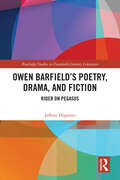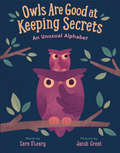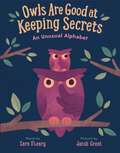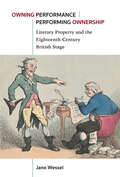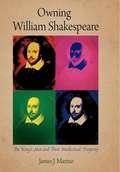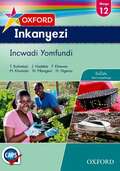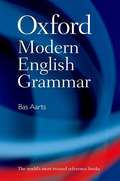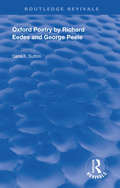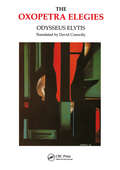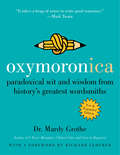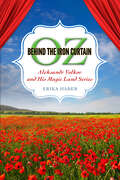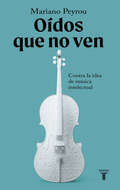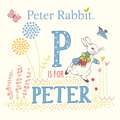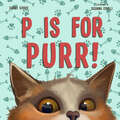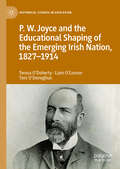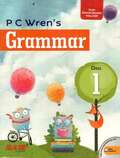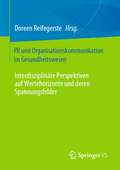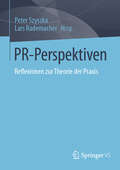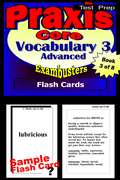- Table View
- List View
Owen Barfield’s Poetry, Drama, and Fiction: Rider on Pegasus (Routledge Studies in Twentieth-Century Literature)
by Jeffrey HipolitoOwen Barfield influenced a diverse range of writers that includes T. S. Eliot, J. R. R. Tolkien, W. H. Auden, Howard Nemerov, and Saul Bellow, and Owen Barfield's Poetry, Drama, and Fiction is the first book to comprehensively explore and assess the literary career of the "fourth Inkling," Owen Barfield. It examines his major poems, plays, and novels, with special attention both to his development over a seventy-year literary career and to the manifold ways in which his work responds with power, originality, and insight to modernist London, the nuclear age, and the dawning era of environmental crisis. With this volume, it is now possible to place into clear view the full career and achievement of Owen Barfield, who has been called the British Heidegger, the first and last Inkling, and the last Romantic.
Owls Are Good At Keeping Secrets: An Unusual Alphabet
by Sara O'LearyFrom the author of the beloved This Is Sadie comes a delightful book of curious, little-known stories about animals -- one for each letter of the alphabet!Did you know that chipmunks love to stay up past their bedtime? Or that dragons cry at happy endings? I bet you'd never have guessed that iguanas sometimes get homesick at sleepovers.Sara O'Leary pulls back the curtain on the animal world and gives us absolutely charming little one-line "facts" about an animal for each letter of the alphabet. Kids will love to see their own quirks reflected in these adorably-rendered creatures, and perhaps will be comforted to know that, just like them, narwhals can be perfectly happy all on their own and quail also get tired of being told to be quiet.This is more than just an alphabet book -- it is a charming, hilarious and touching look at the diversity of personalities in the world, worth many, many re-reads.
Owls are Good at Keeping Secrets: An Unusual Alphabet
by Sara O'LearyA delightful book of curious, little-known "facts" about animals--one for each letter of the alphabet!Did you know that chipmunks love to stay up past their bedtime? Or that dragons cry at happy endings? I bet you'd never have guessed that iguanas sometimes get homesick at sleepovers.Sara O'Leary pulls back the curtain on the animal world and gives us an absolutely charming little one-line "fact" about one animal for each letter of the alphabet. Kids will love to see their own quirks reflected in these adorably rendered creatures, and perhaps will be comforted to know that--just like them--narwhals can be perfectly happy all on their own and quail also get tired of being told to be quiet.This is more than just an alphabet book. It's a charming, hilarious, and touching look at the diversity of personalities in the world--worth many, many rereads.
Owning Performance | Performing Ownership: Literary Property and the Eighteenth-Century British Stage
by Jane WesselIn 1710, England’s first copyright law gave authors the ability to own their works, but it was not until 1833 that literary property law was extended to protect dramatic performance. Between these dates, generations of playwrights grappled for control over their intellectual property in a cultural and legal environment that treated print differently from performance. As ownership became a central concern for many, actors fought to possess their dramatic parts exclusively, playwrights struggled to control and profit from repeat performances of their works, and managers tried to gain a monopoly over the performance of profitable plays. Owning Performance follows the careers of some of the 18th century’s most influential playwrights, actors, and theater managers as they vied for control over the period’s most popular shows. Without protection for dramatic literary property, these figures developed creative extra-legal strategies for controlling the performance of drama—quite literally performing their ownership. Their various strategies resulted in a culture of ephemerality, with many of the period’s most popular works existing only in performance and manuscript copies. Author Jane Wessel explores how playwrights and actors developed strategies for owning their works and how, in turn, theater managers appropriated these strategies, putting constant pressure on artists to innovate. Owning Performance reveals the wide-reaching effects of property law on theatrical culture, tracing a turn away from print that affected the circulation, preservation, and legacy of 18th century drama.
Owning William Shakespeare
by James J. MarinoCopyright is by no means the only device for asserting ownership of a work. Some writers, including playwrights in the early modern period, did not even view print copyright as the most important of their authorial rights. A rich vein of recent scholarship has examined the interaction between royal monopolies, which have been identified with later notions of intrinsic authorial ownership, and the internal copy registration practices of the English book trades. Yet this dialogue was but one part of a still more complicated conversation in early modern England, James J. Marino argues; other customs and other sets of professional demands were at least as important, most strikingly in the exercise of the performance rights of plays.In Owning William Shakespeare James Marino explores the actors' system of intellectual property as something fundamentally different from the property regimes exercised by the London printers or the royal monopolists. Focusing on Hamlet, The Taming of the Shrew, King Lear, and other works, he demonstrates how Shakespeare's acting company asserted ownership of its plays through intense rewriting combined with progressively insistent attribution to Shakespeare. The familiar versions of these plays were created through ongoing revision in the theater, a process that did not necessarily begin with Shakespeare's original manuscript or end when he died. An ascription by the company of any play to "Shakespeare" did not imply that it was following a fixed, authorial text; rather, Marino writes, it indicates an attempt to maintain exclusive control over a set of open-ended, theatrically revised scripts.Combining theater history, textual studies, and literary theory, Owning William Shakespeare rethinks both the way Shakespeare's plays were created and the way they came to be known as his. It overturns a century of scholarship aimed at re-creating the playwright's lost manuscripts, focusing instead on the way the plays continued to live and grow onstage.
Oxford Inkanyezi Incwadi Yomfundi Ibanga 12: UBC Contracted
by T. Buthelezi J. Hadebe F. Kheswa M. Khumalo N. Mlangeni H. NgemaI-Oxford Inkanyezi uhlelo loLimi lwaseKhaya olunothisiwe, olusetshenziswa ngothisha abafundisa lolu limi eNingizimu Afrika yonke. Konke okuqukethwe yilolu hlelo kunohlonze, kanti futhi kuphinde kugcwalise izidingo ze-CAPS. Izindikimba zihlelwe ngendlela yokuthi zihambelane nezidingo zeCAPS. Lokhu kwenza kube lula ukusebenzisa lolu chungechunge lwezincwadi. Inika abafundi isisekelo esinohlonze esizobasiza ukuzilungiselela ukuphumelela ngamalengiso ekuhlolweni kwabo. Uma usuke wazisebenzisa izincwadi ze-Oxford Inkanyezi, kuyohlala kuyizona oyozikhethela impumelelo yakho egunjini lokufunda nasekuhlolweni. Othisha basebenzisa i-Oxford Inkanyezi ngoba: • okuqukethwe kule ncwadi kunothile, kumayelana nezimpilo zabafundi, kudidiyela futhi kuhlanganisa bonke abafundi ukuqinisekisa ukuthi bahlala benomdlandla wokufunda onyakeni wonke • imisebenzi yokwengeza nokwelekelela ibandakanya abafundi abasemazingeni okufunda ahlukene • ukugxilisa okufundisiwe ngokwenza imisebenzi kunika abafundi ithuba lokuzejwayeza kanye nokugxilisa amakhono okuyiwona asemqoka • imisebenzi emayelana nemibhalo yobuciko inika abafundi ithuba lokuthuthukisa ikhono lokuhlaziya imibhalo • isahluko esinezikhali siqukethe amathiphu okuhlola azosiza abafundi ukuthola ulwazi olusemqoka, amathiphu, kanye namakhono abangawasebenzisa uma bezisebenzela ngokwabo ukulungiselela ukuhlolwa nokuphasa ngamalengiso ekuhlolweni kwabo • amaphepha okuhlola ayizibonelo, anika abafundi ithuba lokuzejwayeza indlela yokubuza futhi abacijela ukuhlolwa kwabo • wonke amathuluzi okuhlela enziwe, futhi ayafothokhopheka, onga isikhathi sikathisha aphinde asize ukuqinisekisa ukuthi ijubane abafundisa ngalo abafundi liyilona • uhlelo lokuhlola lunika othisha umhlahlandlela ocacile kanye nezikhali ezilungele ukusetshenziswa ekuhloleni okumiselwe imigomo kanye nasekuhlolweni kwaphakathi nokwasekupheleni konyaka. I-Oxford Inkanyezi inalezi zingxenye ezilandelayo: Incwadi Yomfundi, Isiqondiso Sikathisha kanye neCD yamahhala ukulekelela othisha.
Oxford Inkanyezi Incwadi Yomfundi Ibanga 12: UBC Uncontracted
by T. Buthelezi J. Hadebe F. Kheswa M. Khumalo N. Mlangeni H. NgemaI-Oxford Inkanyezi uhlelo loLimi lwaseKhaya olunothisiwe, olusetshenziswa ngothisha abafundisa lolu limi eNingizimu Afrika yonke. Konke okuqukethwe yilolu hlelo kunohlonze, kanti futhi kuphinde kugcwalise izidingo ze-CAPS. Izindikimba zihlelwe ngendlela yokuthi zihambelane nezidingo zeCAPS. Lokhu kwenza kube lula ukusebenzisa lolu chungechunge lwezincwadi. Inika abafundi isisekelo esinohlonze esizobasiza ukuzilungiselela ukuphumelela ngamalengiso ekuhlolweni kwabo. Uma usuke wazisebenzisa izincwadi ze-Oxford Inkanyezi, kuyohlala kuyizona oyozikhethela impumelelo yakho egunjini lokufunda nasekuhlolweni. Othisha basebenzisa i-Oxford Inkanyezi ngoba: • okuqukethwe kule ncwadi kunothile, kumayelana nezimpilo zabafundi, kudidiyela futhi kuhlanganisa bonke abafundi ukuqinisekisa ukuthi bahlala benomdlandla wokufunda onyakeni wonke • imisebenzi yokwengeza nokwelekelela ibandakanya abafundi abasemazingeni okufunda ahlukene • ukugxilisa okufundisiwe ngokwenza imisebenzi kunika abafundi ithuba lokuzejwayeza kanye nokugxilisa amakhono okuyiwona asemqoka • imisebenzi emayelana nemibhalo yobuciko inika abafundi ithuba lokuthuthukisa ikhono lokuhlaziya imibhalo • isahluko esinezikhali siqukethe amathiphu okuhlola azosiza abafundi ukuthola ulwazi olusemqoka, amathiphu, kanye namakhono abangawasebenzisa uma bezisebenzela ngokwabo ukulungiselela ukuhlolwa nokuphasa ngamalengiso ekuhlolweni kwabo • amaphepha okuhlola ayizibonelo, anika abafundi ithuba lokuzejwayeza indlela yokubuza futhi abacijela ukuhlolwa kwabo • wonke amathuluzi okuhlela enziwe, futhi ayafothokhopheka, onga isikhathi sikathisha aphinde asize ukuqinisekisa ukuthi ijubane abafundisa ngalo abafundi liyilona • uhlelo lokuhlola lunika othisha umhlahlandlela ocacile kanye nezikhali ezilungele ukusetshenziswa ekuhloleni okumiselwe imigomo kanye nasekuhlolweni kwaphakathi nokwasekupheleni konyaka. I-Oxford Inkanyezi inalezi zingxenye ezilandelayo: Incwadi Yomfundi, Isiqondiso Sikathisha kanye neCD yamahhala ukulekelela othisha.
Oxford Modern English Grammar
by Bas AartsOxford Modern English Grammar is Oxford's brand new and definitive guide to English grammar. This book has been written by a leading expert in the field, covers both British and American English, and makes use of authentic spoken and written examples. Arranged in four clear parts for ease of use, its comprehensive coverage ranges from the very basic to the most complex aspects of grammar, all of which are explained clearly yet authoritatively. This descriptive source of reference is invaluable for those with an interest in the English language,undergraduate and postgraduate students, and for anyone who would like a clear guide to English grammar and how it is used.
Oxford Poetry by Richard Eedes and George Peele (Routledge Revivals)
by Richard EedesPublished in 1995: The present volume contains two comparatively lengthy Latin hexameter poems that emanated from this circle. One is by Richard Eedes; the other is anonymous, although for the purposes of this book the author provisionally accepted Tucker Brooke’s attribution to George Peele.
Oxopetra Elegies
by David Connolly Odysseas ElytesFirst Published in 1997. 'Geographically speaking 'Oxopetra' is a promontory on the island of Astypalaea. It is the 'other rock'. For me, it is the farthest point of the land in the sea, the farthest point of our era in another era, and the farthest point of my life in death... Odysseus Elytis.' Odysseus Elytis was born in Crete in 1911 and published the first of his poems in 1935. He was influenced by French Surrealism and travelled widely, and in post-war years lived in France with many other leading poets and artists of his generation. In 1979 he was awarded the Nobel Prize of Literature. The Oxopetra Elegies is a recent collection and is considered by many Greek critics to contain some of the finest and most important poems he has ever written. The Greek Poetry Archive features monographs on key modern Greek poets, from the nineteenth century to the present, and a bilingual collection of their poetry translated into English.
Oxymoronica
by Dr Mardy Grotheox-y-mor-on-i-ca (OK-se-mor-ON-uh-ca) noun, plural: Any variety of tantalizing, self-contradictory statements or observations that on the surface appear false or illogical, but at a deeper level are true, often profoundly true. See also oxymoron, paradox.examples:"Melancholy is the pleasure of being sad."Victor Hugo"To lead the people, walk behind them." Lao-tzu"You'd be surprised how much it coststo look this cheap."Dolly PartonYou won't find the word "oxymoronica" in any dictionary (at least not yet) because Dr. Mardy Grothe introduces it to readers in this delightful collection of 1,400 of the most provocative quotations of all time. From ancient thinkers like Confucius, Aristotle, and Saint Augustine to great writers like Shakespeare, Oscar Wilde, and G. B. Shaw to modern social observers like Woody Allen and Lily Tomlin, Oxymoronica celebrates the power and beauty of paradoxical thinking. All areas of human activity are explored, including love, sex and romance, politics, the arts, the literary life, and, of course, marriage and family life. The wise and witty observations in this book are as highly entertaining as they are intellectually nourishing and are sure to grab the attention of language lovers everywhere.
Oxymoronica
by Mardy Grotheox-y-mor-on-i-ca (OK-se-mor-ON-uh-ca) noun, plural: Any variety of tantalizing, self-contradictory statements or observations that on the surface appear false or illogical, but at a deeper level are true, often profoundly true. See also oxymoron, paradox. examples: "Melancholy is the pleasure of being sad." Victor Hugo "To lead the people, walk behind them." Lao-tzu "You'd be surprised how much it costs to look this cheap." Dolly Parton You won't find the word "oxymoronica" in any dictionary (at least not yet) because Dr. Mardy Grothe introduces it to readers in this delightful collection of 1,400 of the most provocative quotations of all time. From ancient thinkers like Confucius, Aristotle, and Saint Augustine to great writers like Shakespeare, Oscar Wilde, and G. B. Shaw to modern social observers like Woody Allen and Lily Tomlin, Oxymoronica celebrates the power and beauty of paradoxical thinking. All areas of human activity are explored, including love, sex and romance, politics, the arts, the literary life, and, of course, marriage and family life. The wise and witty observations in this book are as highly entertaining as they are intellectually nourishing and are sure to grab the attention of language lovers everywhere.
Oxymoronica
by Mardy Grotheox-y-mor-on-i-ca (OK-se-mor-ON-uh-ca) noun, plural: Any variety of tantalizing, self-contradictory statements or observations that on the surface appear false or illogical, but at a deeper level are true, often profoundly true. See also oxymoron, paradox.examples:"Melancholy is the pleasure of being sad."Victor Hugo"To lead the people, walk behind them." Lao-tzu"You'd be surprised how much it coststo look this cheap."Dolly PartonYou won't find the word "oxymoronica" in any dictionary (at least not yet) because Dr. Mardy Grothe introduces it to readers in this delightful collection of 1,400 of the most provocative quotations of all time. From ancient thinkers like Confucius, Aristotle, and Saint Augustine to great writers like Shakespeare, Oscar Wilde, and G. B. Shaw to modern social observers like Woody Allen and Lily Tomlin, Oxymoronica celebrates the power and beauty of paradoxical thinking. All areas of human activity are explored, including love, sex and romance, politics, the arts, the literary life, and, of course, marriage and family life. The wise and witty observations in this book are as highly entertaining as they are intellectually nourishing and are sure to grab the attention of language lovers everywhere.
Oz behind the Iron Curtain: Aleksandr Volkov and His Magic Land Series (Children's Literature Association Series)
by Erika HaberRecipient of the 2018 Outstanding Faculty Research Achievement Award in the Department of Languages, Literatures, and Linguistics at Syracuse UniversityIn 1939, Aleksandr Volkov (1891-1977) published Wizard of the Emerald City, a revised version of L. Frank Baum's The Wonderful Wizard of Oz. Only a line on the copyright page explained the book as a "reworking" of the American story. Readers credited Volkov as author rather than translator. Volkov, an unknown and inexperienced author before World War II, tried to break into the politically charged field of Soviet children's literature with an American fairy tale. During the height of Stalin's purges, Volkov adapted and published this fairy tale in the Soviet Union despite enormous, sometimes deadly, obstacles.Marketed as Volkov's original work, Wizard of the Emerald City spawned a series that was translated into more than a dozen languages and became a staple of Soviet popular culture, not unlike Baum's fourteen-volume Oz series in the United States. Volkov's books inspired a television series, plays, films, musicals, animated cartoons, and a museum. Today, children's authors and fans continue to add volumes to the Magic Land series. Several generations of Soviet Russian and Eastern European children grew up with Volkov's writings, yet know little about the author and even less about his American source, L. Frank Baum. Most Americans have never heard of Volkov and know nothing of his impact in the Soviet Union, and those who do know of him regard his efforts as plagiarism.Erika Haber demonstrates how the works of both Baum and Volkov evolved from being popular children's literature and became compelling and enduring cultural icons in both the US and USSR/Russia, despite being dismissed and ignored by critics, scholars, and librarians for many years.
Oídos que no ven: Contra la idea de música intelectual
by Mariano Peyrou TubertUna mirada divertida y reveladora sobre la música que invita a la escucha libre, desprejuiciada y mucho más placentera de cualquier género musical. Este libro derriba con gracia y brillantez una idea que a menudo nos impide disfrutar abiertamente de ciertos géneros y obras: la idea de «música intelectual», que tan a menudo se interpone entre el oyente y el placer de la escucha. Además, ofrece algunas claves para que cualquiera pueda adentrarse en ciertas músicas supuestamente más impenetrables. Con un tono cercano, por medio de anécdotas divertidas y reveladoras y empleando un enfoque completamente alejado de lo académico, Peyrou plantea una serie de argumentos en contra de la noción de que ciertos estilos exigen una escucha intelectualizada. El libro, no obstante, desborda ese objetivo y se convierte en una lección sobre cómo funciona la música: cómo piensan los compositores y qué deseos los guían, en qué consiste la innovación y por qué encuentra tanta resistencia entre el público, qué tienen en común los diversos géneros y qué los diferencia, qué actitud es la más adecuada por parte de los oyentes. Relacionando músicas muy variadas (clásica y contemporánea, popular y folclórica, jazz, rock) pero también ideas procedentes del arte, la literatura, la filosofía y la antropología, el autor traza conexiones sorprendentes y propone una manera diferente de escuchar. La crítica ha dicho: «Libro a libro, ha renovado los modos del lenguaje y los enfoques de la mirada de una obra poética y narrativa tan personal como extrañamente prodigiosa».ANTONIO ORTEGA, Babelia «Esas raras veces en que el ingenio se acompaña de sustancia, el resultado puede ser fascinante. En ese momento es cuando yo dejo de llamarlo "ingenio" y lo llamo "talento"».SARA MESA, Estado Crítico «Su sentido del humor y su controlado gusto por la broma lingüística adquieren un feliz tono propio».NADAL SUAU, El Cultural «Innovador, ácido, lúdico, lúcido».ÁNGELES LÓPEZ, La Razón «Uno de nuestros grandes poetas del lenguaje».VICENTE LUIS MORA, Diario de Lecturas «Mariano Peyrou me parece un excelente escritor».JOSÉ MARÍA GUELBENZU «Una de las escrituras más personales y sorprendentes del panorama actual».LUIS BAGUÉ QUÍLEZ, Babelia «Uno de los narradores españoles más inteligentes en el juego con el lenguaje».EUGENIO FUENTES, La Nueva España «Dan ganas de anunciarle al lector que esto no es una novela. ¿Y esto es bueno o malo? En el caso del autor madrileño, es bueno. Muy bueno. Endiabladamente inteligente».J. ERNESTO AYALA-DIP, Babelia, sobre Los nombres de las cosas «Son muchas las cuestiones existenciales y artísticas que plantea Delos otros. Impulsada por un estilo introspectivo, con derivas en el flujo de la conciencia y diálogos con frases inconclusas. Peyrou sobrecoge al lector».FRANCISCO SOLANO, Babelia «Peyrou da rienda suelta a su aventura lingüística sin que la vanguardia desemboque jamás en gratuidad».JUAN ANDRÉS GARCÍA ROMÁN, Babab «No es una novela de humor, y sin embargo es divertida como pocas que haya leído en los últimos años».JUAN MARQUÉS, La Esfera de Papel, sobre Los nombres de las cosas
P Is for Peter (Peter Rabbit)
by Beatrix PotterFeaturing classic Peter Rabbit characters, kids will love learning their ABCs with this beautiful and whimsical alphabet board book perfect for gifting!A is for . . . A very little bunnyB is for . . . such Big Bounces!In this beautiful, charming, and whimsical board book, Peter Rabbit and his friends introduce the alphabet. Artistic and lyrical rather than strongly educational, this is a perfect introduction to the world of Beatrix Potter for very young children.
P Is for Potato: An Idaho Alphabet
by Stan Steiner Joy Steiner[From the dust jacket:] "If you dig through the history of Idaho, you'll find more than just spuds! P is for Potato: An Idaho Alphabet gives an A-Z guided tour to the culture, history, and wonders of this state. From the capital city of Boise, to Hells Canyon (deepest river gorge in North America), to the snow-covered slopes of Sun Valley, Idaho's riches go beyond the famous vegetable. Written in a two-tier format, beginning readers will enjoy the simple rhymes while older students discover facts about each topic letter in the sidebar expository. "Satisfy your curiosity about any of the states in the United States by looking in the Bookshare collection for the alphabet books for the state where you live or the states where your family and friends live.
P is for Pelican: A Louisiana Alphabet
by Anita C. PrietoAn alphabet book that introduces Louisiana's history, culture, and landscape, from the official reptile, alligator, to zydeco.
P.W. Joyce and the Educational Shaping of the Emerging Irish Nation, 1827-1914 (Historical Studies in Education)
by Tom O'Donoghue Teresa O'Doherty Liam O’ConnorThis book provides an exposition on the professional and cultural life of Patrick Weston Joyce (1827–1914), more popularly known as P. W. Joyce, who lived and worked during the final phase of British rule in Ireland. The focus throughout is very much on how family, locale, and schooling influenced this significant Irish patriot, polymath, and pioneering pedagogue who worked across a range of disciplines, including education, language, history, and music. Moreover, attention is paid to how his achievements were possible only because of the variety of leading roles he played in the development of the Irish National School System between 1845 and 1893. Thus positioned, Joyce was in many ways a significant choreographer of a slow revolution in which education, in both formal and informal settings, was used to educate the Irish people regarding their cultural heritage.
PC Wren's Grammar Class 1
by Pc Wren N D V Prasada RaoPC Wren's Grammar is the revised edition of the highly successful series and is based on user feedback. A set of eight English grammar textbooks for classes 1 to 8, the series, acknowledged as one of the best and most authoritative of traditional grammars, has been specially designed to meet the needs of the learners in the primary and middle schools today. PC Wren's Grammar provides ample guidance and practice in sentence building, correct usage, comprehension, composition and other allied areas to equip the learners with the ability to use the English language effectively in real-life situations. The series aims at simplicity of language in its treatment of each topic with multiple examples, reinforced by extensive drills. The sections on comprehension and composition set out to help the learners put their knowledge ofgrammar to more practical use and widen their communicative abilities.
PCI Reading Program Level One: Reproducible Books
by Janie Haugen-McLane Janie Holt Jill L. HaneyThe PCI Reading Program supplements to provide additional repetition and practice with the words in the program. These supplements can be used as literacy centers in a classroom. The reproducible books can also be sent home for additional reading practice.
PR und Organisationskommunikation im Gesundheitswesen: Interdisziplinäre Perspektiven auf Wertehorizonte und deren Spannungsfelder
by Doreen ReifegersteDas Gesundheitssystem ist geprägt von medizinischen, gemeinwohlorientierten und ökonomischen Interessen. Diese Zielgrößen sind dabei vor dem Hintergrund gesellschaftlicher und systembezogener Wandlungsprozesse wie der Patientenorientierung und Digitalisierung zu bewerten. In der Gesamtschau ergibt dies ein Spannungsfeld konkurrierender und komplementärer Ziele in der internen und externen Kommunikation von Kliniken, Pharmaunternehmen, Krankenversicherungen und einzelner Akteure des Gesundheitswesens. Auf dieses Spannungsfeld geht dieser Band ein und integriert dabei die Perspektiven der PR-und Organisationskommunikation sowie der Gesundheitskommunikation.
PR-Perspektiven: Reflexionen zur Theorie der Praxis
by Lars Rademacher Peter SzyszkaMit seinen Beiträgen wendet sich der Band bewusst gegen Mainstream-Positionen in Wissenschaft und Praxis rund um Public Relations. Die teilweise essayistische Form der Beiträge wurde bewusst gewählt, um einen kreativeren Umgang der Mitwirkenden mit ihren jeweils ausgewählten Gegenständen zu erleichtern. Die Auswahl orientiert sich an Themenfeldern, die in enger Verbindung mit dem Wirken von Klaus Kocks zwischen Wissenschaft und Praxis stehen.Herausgekommen sind zwölf theoretische Reflexionen von Praxis, die der Provokation des Einleitungsbeitrages folgend bekannte Themen neu oder anders denken und deren Durchdringung in weiterführenden Diskussionen herausfordern.
PRAXIS Core Test Prep Flash Cards: Advanced Vocabulary (Exambusters PRAXIS Core Workbook #3 of 8)
by Ace Inc.<P><P><i>Advisory: Bookshare has learned that this book offers only partial accessibility. We have kept it in the collection because it is useful for some of our members. Benetech is actively working on projects to improve accessibility issues such as these.</i><P><P> 350 words every well-educated person should know. While you may not hear them every day, they can show up on the PRAXIS 1/PPST test, and understanding them will boost your score. <P><P>Includes sample sentence, part of speech, pronunciation, succinct, easy-to-remember definition, and common synonyms and antonyms. <P>EXAMBUSTERS PRAXIS Prep Workbooks provide comprehensive, fundamental PRAXIS review--one fact at a time--to prepare students to take practice PRAXIS tests. Each PRAXIS study guide focuses on one specific subject area covered on the PRAXIS exam. From 300 to 600 questions and answers, each volume in the PRAXIS series is a quick and easy, focused read. Reviewing PRAXIS flash cards is the first step toward more confident PRAXIS preparation and ultimately, higher PRAXIS exam scores!
